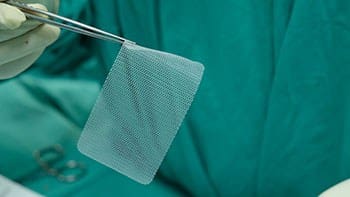
A hernia occurs whenever an organ or fatty tissue pushes through a weak spot in a muscle wall, usually in the abdomen or the groin.
To treat the hernia, a doctor usually inserts mesh to reinforce the muscle wall and prevent a hernia from developing again.
Unfortunately, there are many complications to surgery, and mesh infection is one of them. Correcting the problem often involves surgery, since antibiotics are generally inadequate to deal with the infection.
Because correction surgery is painful and time-consuming, many injured patients are holed up at home or the hospital and unable to work, suffering serious economic losses as a result.
If you recognize any hernia mesh infection symptoms, obtain immediate medical treatment, which can make the difference between life and death.
Once you receive treatment, reach out to a Philadelphia medical malpractice attorney. We will gladly discuss your options with you.
Chronic Pain
Many people report feeling considerable pain in the groin area after surgery. The pain is so intense that people cannot go about their daily activities, such as going to the post office or grocery store.
Some people even find it difficult to stand. If you notice pain that doesn’t go away after a couple of days, then you should see a doctor. You might have an infection.
Failure to Heal
When hernia mesh becomes infected, the incision site does not heal properly. Instead, a buildup of fluid might result at the incision site, called a seroma.
Seromas are painful and messy, and they prevent the incision from healing properly.
If you notice fluid leaking from your incision, or if healing is going very slowly, then you should contact a doctor to check for signs of infection.
Warmth at the Incision Site
Another sign of infection is warmth at the incision site. Infections generate quite a bit of heat, so the skin around your incision could be very warm and sometimes even hot. Go to a doctor to check whether you have an infection.
Hardening at the Incision Site
The incision site might begin swelling or it could be hard to the touch. These are also signs of infection after hernia surgery that you should be aware of.
Flu-Like Symptoms
Other signs of mesh infection include symptoms that we normally associate with influenza. Many people can feel any of the following:
- Aches
- Fever
- Nausea
- Chills
- Headache
- Vomiting
- Fatigue
If you think you have developed the flu shortly after hernia mesh surgery, then you can’t rule out that you have an infection instead.
If flu symptoms persist for several weeks, then the likelihood that you have an infection is much higher.
Tooth Problems
Infections can cause problems with the teeth. Many people with an infected hernia mesh end up experiencing the following tooth problems:
- Tooth weakness
- Chipped teeth
- Tooth pain
- Tooth loss
If you’ve never had tooth problems before, then you should probably take a trip to the doctor to discuss whether an infection with the hernia mesh is to blame.
Diagnosing a Hernia Mesh Infection
Your doctor will listen to you explain your symptoms and then might order imaging tests, such as a CT scan or an ultrasound, to help diagnose whether you have an infected mesh. A doctor will also try to exclude other problems.
If you do have an infection, then your doctor might need to remove the mesh. Antibiotics are generally inadequate by themselves to treat an infection in this area, so you are at risk of having it spread to other parts of your body.
then your doctor might need to remove the mesh. Antibiotics are generally inadequate by themselves to treat an infection in this area, so you are at risk of having it spread to other parts of your body.
Contact a Philadelphia Medical Malpractice Attorney
Hernia mesh surgery has helped countless people manage muscle wall weakness and get back on their feet. However, complications still occur with many patients, and some of the complications are avoidable.
If you suspect that a doctor made a mistake during your surgery, or if your hernia mesh is defective, you could have a claim for compensation. You should contact PhillyLaw right away to discuss your options.
You might be able to sue to cover the costs of corrective surgery, lost wages, and recover damages for your pain and suffering.
Please avoid delay.
You can reach one of our attorneys by calling us for a free case evaluation or sending us an email. All of our case reviews are confidential and completely free. We are open 24/7.

